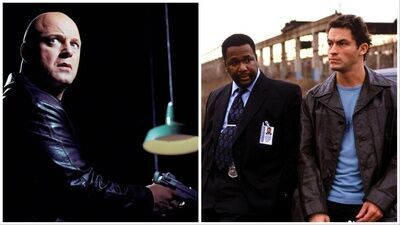Even the superficial adhesives of Black culture in “The Shield” feel out of place. They’re flat, impoverished recreations of the real thing, outdated even when they first appeared on the series over 20 years ago. This problem extends to something as seemingly minor as the names of gangster characters. In contrast to what all the film and TV gangsters written by white folks would have viewers believe, Black gangsterdom/community is not overly reliant on the combination of an initial and the word bone (J Bone, C Bone, T Bone, etc) or an initial and any word, for that matter (T-Gun in “The Shield”), and I have never in my life run into gangsters who go by names like Felonious T, Slap, or Deadeye, to name three other street criminals on “The Shield”. It would have been much easier and more convincing to just refer to the characters by their given names, but the show seems more obsessed with street names, likely because the show’s cops are obsessed with them and bemused by them and pass the laughs they get off of these people’s nicknames to the audience. Additionally, most of these characters are portrayed as bumbling/inept (Rondell Williams, Taylor Orr) or sometimes a combination of vicious and bumbling. They almost steal the wrong item. They kill for nonsensical reasons. They steal food stamps. Week after week the show engaged in a carnival attraction approach to real life woes in the inner-city of Los Angeles. It was always focused on the most ghoulish or ridiculous characters, shot out of the cannons of the hammiest, most cartoonish performances this side of Jimmy Walker as J.J. on “Good Times.”
Meanwhile, the casting of black administrators and police personnel garnered names as respected as Forest Whitaker, CCH Pounder, Carl Weathers, Ana Marie Horseford, and Brian White. The community scores their highest gold star with a small story arc in “On Tilt” for Andre 3000 that’s drenched in respectability politics. The story of a community member creatively taking the law into his own hands and coming up with a way to clear his streets (of sex workers) is admirable on an individual level while also acting as reinforcement for an answer that remains popular to those looking in from the outside through the lens of “Why don’t these people get it?”. The biggest name playing a gangster in the show is Anthony Anderson as Antwon Mitchell, and while Anderson is compelling as an emotionally scarred gang leader (a pivotal scene with Glenn Close impresses), whenever the performance veers into the intersection of the pulpit and the political soapbox, he comes off as an unconvincing Kroger-brand version of Malcolm X. Anderson’s inability to provide layers and levels makes it clear he doesn’t hold the weight or carry the multitudes of an actor like “The Wire” and “Boardwalk Empire” star Michael K. Williams. The storylines fare no better, many are reductive, (the show’s treatment of Black Women is another essay unto itself) indicating a paternalistic condescension, and often echoing a common talking point of the police that the Black community is extremely apathetic.
It gets worse when it comes to any story regarding radical black politics within the community, where the black folks expressing these sentiments are either revealed to be fraudulent, criminal, or insane. The former takes its form once again in the initial episode of season four when Antwon Mitchell makes his first appearance, fresh out of jail, and presents himself as reformed by questioning the role of police and a litany of poor social policies in the community, the show makes it pretty clear Antwon is not on the up and up from jump. In another episode in S3 titled “Slipknot” (possibly the show’s most reprehensible episode) a gang member called Twizzy sets up a lynching for the sole purpose of stopping a truce and getting “the Black back” to a neighborhood. Yes, you read that right: a Black person strings up a black child from a tree to bring a strong sense of solidarity back to the community. This is the whitest of white nonsense, something that could be born only in the audacious imaginations of a guilty party—a vile and disingenuous plot to contemptuously undermine empathy with a beleaguered community.

